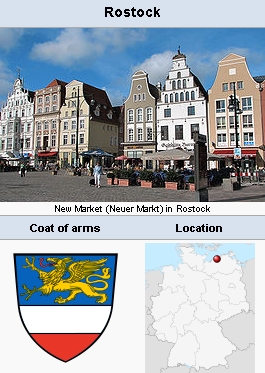Rostock (Mecklenburg-Vorpommern, Germany)

Rostock, a city (population in 1959, 114,869; 200,414 in 2006; coordinates: 54° 5′ 0″ N, 12° 8′ 0″ E) in Mecklenburg-Vorpommern, Germany. The Anabaptist movement found entry to this place very early. Evidently the soil had been prepared by the Bohemian Brethren, who had members living in the city and its vicinity for many years. The pastor of the church of St. Mary and Dr. Johann Oldendorp, the syndicus of the city, were friendly toward the Anabaptists. The mandates of the Hanseatic League were for a while not published. All violent measures were avoided. However, in 1535, Rostock was represented at a conference of Protestant theologians at Hamburg, which stated that God was punishing the world with the Anabaptists and asked the government to make Anabaptism punishable by law.
The idea that Bernhard Rothmann was living in Rostock (derived from a letter written by the council of Löeck to that of Rostock on 6 June 1537) is probably an error. It is more likely that Obbe Philips lived here for a time. This was reported to Johann Gartzen, pastor of the church of St. Peter in Hamburg, by Joachim Kükenbiter, a pastor in Schwerin in 1538, with the information that Philips was trying to lure his brethren in other towns of Mecklenburg to Rostock. Obbe Philips presumably wrote his important confession (Bekentenisse) in Rostock. From this place twenty important tracts were sent to the Mennonites in Holland.
On 28 July 1548, the council of Rostock issued a new decree against the Anabaptists. All persons who had come to the city from the Netherlands within the previous four years were required to present to the authorities within eight days a testimonial from their former residence showing that they were not poisoned by the wicked error of Anabaptism and had lived an honest life there. Those who were unable to do this were requested to leave the city and its environs within eight days. From that time nothing more is heard of Anabaptists in Rostock. They may have remained quietly in the city for a long time; a large part of them migrated to Prussia and Lithuania or joined the Lutherans. In 1912 fifteen Mennonites were counted in the city.
Bibliography
Dollinger, R. Geschicte der Mennoniten in Schleswig-Holstein. Neumünster, 1930: 193.
Hege, Christian and Christian Neff. Mennonitisches Lexikon, 4 vols. Frankfurt & Weierhof: Hege; Karlsruhe: Schneider, 1913-1967: v. III, 550.
Mennonitische Blätter (1912): 87.
Wichmann, C. M. Mecklenburgs altniedersächsische Literatur II. 1600-25. Schwerin, 1885.
Maps
Map:Rostock, Mecklenburg-Vorpommern
| Author(s) | Christian Neff |
|---|---|
| Date Published | 1959 |
Cite This Article
MLA style
Neff, Christian. "Rostock (Mecklenburg-Vorpommern, Germany)." Global Anabaptist Mennonite Encyclopedia Online. 1959. Web. 19 Apr 2024. https://gameo.org/index.php?title=Rostock_(Mecklenburg-Vorpommern,_Germany)&oldid=106696.
APA style
Neff, Christian. (1959). Rostock (Mecklenburg-Vorpommern, Germany). Global Anabaptist Mennonite Encyclopedia Online. Retrieved 19 April 2024, from https://gameo.org/index.php?title=Rostock_(Mecklenburg-Vorpommern,_Germany)&oldid=106696.
Adapted by permission of Herald Press, Harrisonburg, Virginia, from Mennonite Encyclopedia, Vol. 4, p. 363. All rights reserved.
©1996-2024 by the Global Anabaptist Mennonite Encyclopedia Online. All rights reserved.
